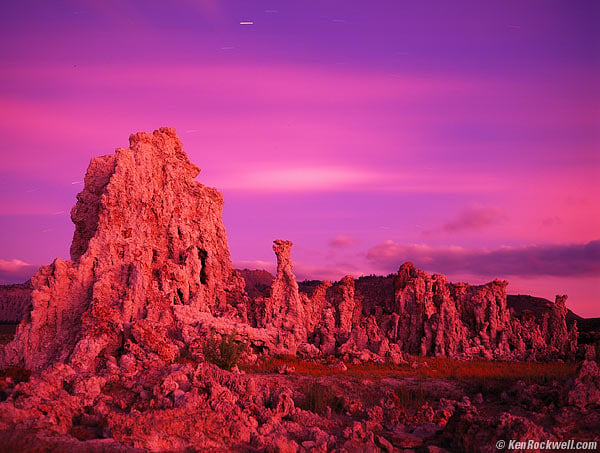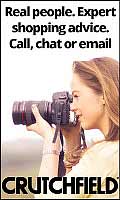Home Donate New Search Gallery Reviews How-To Books Links Workshops About Contact
Your Camera
Doesn't Matter
©
2013 Ken Rockwell
Also in Spanish, Ukrainian, French, Italian, German, Chinese, Dutch, Hebrew, Vietnamese, Russian, Portuguese and Hungarian.
Mono Lake, Saturday, 25 July 1993, snapped with a broken camera. bigger. tech details.
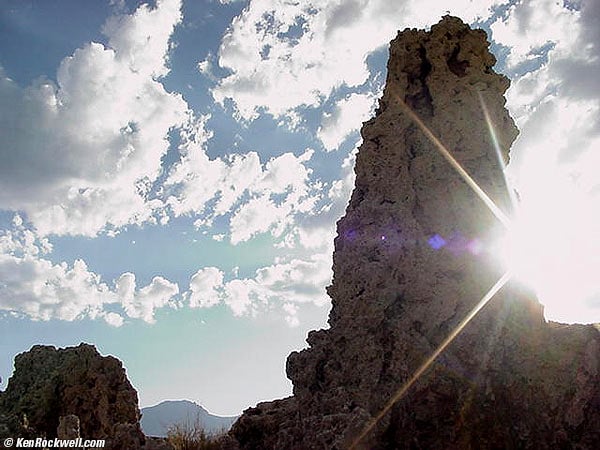
Mono Lake, 11 August 2001, snapped with a floppy-disc camera.
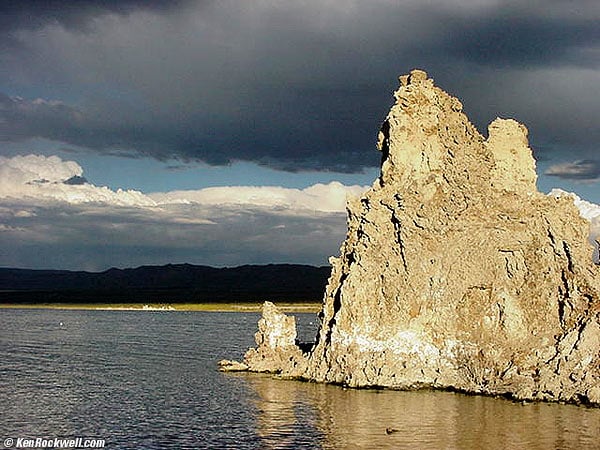
Mono Lake, 11 August 2001, snapped with a floppy-disc camera.
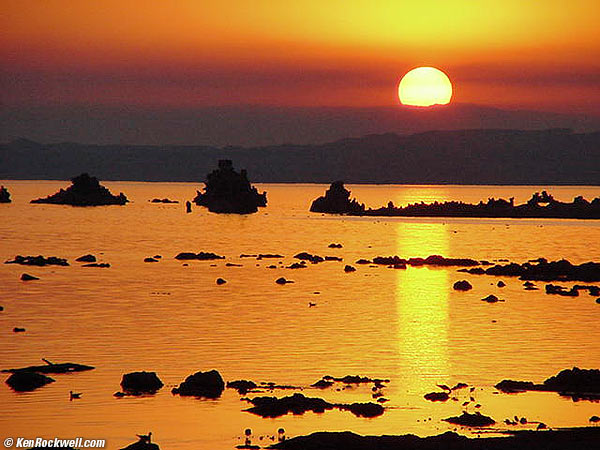
Dawn, Mono Lake, 12 August 2001, snapped with a floppy-disc camera.
This free website's biggest source of support is when you use any of these links when you get anything, regardless of the country in which you live. It helps me keep adding to this free website when you get yours through these links — but I receive nothing for my efforts if you buy elsewhere. Thanks for your support! Ken.
Better Pictures: The Secret Composition Simplicity FART Shadows Lighting
Adjustments It's Not Your Camera Exposure WB Don't Worry: Shoot
NEW, 09 September 2013: Canon 5D Mk III/24-70 II vs. SL1/18-55 STM Resolution and High ISO Comparison. As expected, the $699 combo looks the same as the $5,800 combo.
|
I buy only from these approved sources. I can't vouch for ads below. |
The shots at the top were shot 12 or 20 years ago. See more examples iPhone 5 Sample Images, at A $150 vs. a $5,000 Camera. See what great shots can be made with an obsolete $200 Canon A620, and see what I shot in 2008 on a pocket camera, or in 2003 on one of Canon's cheapest digital point-and-shoots at the time.
 See Chase Jarvis' art book, The Best Camera, shot entirely on his iPhone. See the online work shot exclusively on his iPhone.
See Chase Jarvis' art book, The Best Camera, shot entirely on his iPhone. See the online work shot exclusively on his iPhone.
Here are some shots I made on an expired disposable camera:
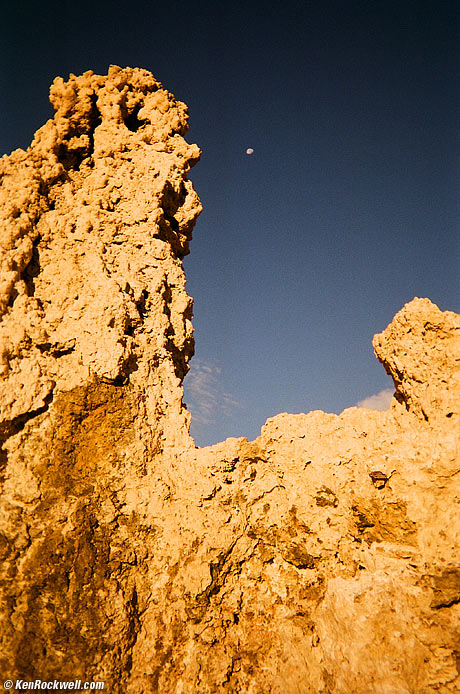
Moon over Mono Lake, October 2008. Shot with an expired Fuji QuickSnap 400, 85C filter held over the front.
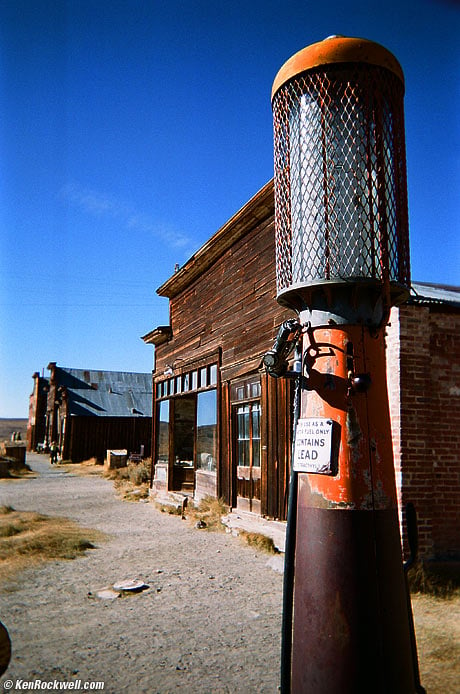
Bodie, October 2008. Shot with expired Fuji QuickSnap 400.
If you can shoot well, all you need is a disposable, toy camera or a camera phone to create great work. If you're not talented, it doesn't matter if you buy a Nikon D3X or Leica; your work will still be uninspired.
It's always better to spend your time and money on learning art and photography, not by spending it on more cameras.
Why is it that with over 60 years of improvements in cameras, lens sharpness and film grain, resolution and dynamic range that no one has been able to equal what Ansel Adams did back in the 1940s?
Ansel didn't even have Photoshop! How did he do it? Most attempts fall short, some are as good but different like Jack Dykinga, but no one is the same.
Try to tell an American he can't, and he will: Man Uses Barbie Fishing Rod for Record Catch!
Why is it that photographers loaded with the most extraordinary gear who use the internet to get the exact GPS coordinates of Jack's or Ansel's photo locations and hike out there with the image in hand to ensure an exact copy (illegal by US copyright laws and common decency), that they get something that might look similar, but lacks all the impact and emotion of the original they thought they copied?
I'm not kidding. A bunch of these turkeys used university astronomers to predict the one time in almost two decades that the conditions would match and had 300 of the clueless converge at just the right spot. They still didn't get the clouds, snow or shadows right. This makes Ansel or any other creative artist cringe. Of course they didn't get anything like what they wanted. Art is a lot more.
Compelling photographs come from inspiration, not duplication.
Someone asked "If I got a camera with only 6 or 7 MP, can I make good pictures with it?"
That reminds me about the guy who breaks a wrist and asks his doctor: "Doctor, will I be able to play the piano after this heals?" The doctor replies "Absolutely, no problem!" The man laughs, and points out that that's great, because he never could play the piano before!
Buying a Bösendorfer doesn't mean you can play the piano. Buying a great camera doesn't mean you can create compelling photographs. Good pianists can play on anything and a good photographer can make great images with a disposable camera.
As we all saw in The Blues Brothers, give Brother Ray a keyboard with a sticky action and he'll play so movingly that the whole town will be up and dancing.
Cameras don't take pictures, photographers do. Cameras are just another artist's tool.
Why is it that even though everyone knows that Photoshop can be used to take any bad image and turn it into a masterpiece, that even after hours of massaging these images look worse than when one started?
Maybe
because it's entirely an artist's eye, patience and skill that makes
an image and not his tools. Even Ansel said "The single most important component
of a camera is the twelve inches behind
it."
A camera catches your imagination. No imagination, no photo - just crap. The word "image" comes from the word "imagination." It doesn't come come from "lens sharpness" or "noise levels." David LaChapelle's work is all about his imagination, not his camera. Setting up these crazy shots is the hard part. Once set up, any camera could catch them. Give me David LaChapelle's camera and I won't get anything like he does, even if you give me the same star performers.
The only reason I have a huge lens in my photo on my home page is so I don't have to say "photographer" or "photography." The lens makes it obvious much quicker than words. That's what visual communication is all about: thinking long and hard to make your point clearly and quickly. I haven't used that huge lens in years.
Just about any camera, regardless of how good or bad it is, can be used to create outstanding photographs for magazine covers, winning photo contests and hanging in art galleries. The quality of a lens or camera has almost nothing do with the quality of images it can be used to produce.
Joe Holmes' limited-edition 13 x 19" prints of his American Museum of Natural History series sell at Manhattan's Jen Bekman Gallery for $650 each. They're made on a D70.
Another San Diego pro, Kirsten Gallon earns her living using Nikon's two very cheapest lenses, the 18-55 and 70-300 G.
There are plenty of shows selling shots from Holgas for a lot more money, just that those folks don't tell me about it. Holgas sold for $14.95 in 2006, brand new, here. You can see an award-winning shot made with a Holga hanging in Washington, D.C.'s Hemicycle Gallery of the Corcoran Museum of Art in their 2006 Eyes of History competition of the White House News Photographers Association.
Walker Evans once said "People always ask me what camera I use. It's not the camera, it's - - - " and he tapped his temple with his index finger.
Jesus Christ's dad Joseph built a masterpiece of a wooden staircase in a church in New Mexico in 1873, and does anyone care what tools he used? Search all you want, you'll find plenty of scholarly discussion but never of the tools.
Your equipment DOES NOT affect the quality of your image. The less time and effort you spend worrying about your equipment the more time and effort you can spend creating great images. The right equipment just makes it easier, faster or more convenient for you to get the results you need.
"Any good modern lens is corrected for maximum definition at the larger stops. Using a small stop only increases depth..." Ansel Adams, June 3, 1937, in a reply to Edward Weston asking for lens suggestions, page 244 of Ansel's autobiography. Ansel made fantastically sharp images seventy years ago without wasting time worrying about how sharp his lenses were. With seventy years of improvement we're far better off concentrating on making stunning photos than photographing test charts. Of course these large format lenses of the 1930s and today are slow, about f/5.6 typically. Small format and digital lenses work best at about 2 stops down.
Buying new gear will NOT improve your photography. For decades I thought "if I only had that new lens" that all my photo wants would be satisfied. Nope. I still want that "one more lens," and I've been shooting for over 30 years. There is always one more lens. Get over it. See "The Station" by Robert J. Hastings, as published in "Dear Abby" in 1999, for a better explanation.
The camera's only job is to get out of the way of making photographs.
Ernst Haas commented on this in a workshop in 1985:
Two
laddies from Nova Scotia had made a huge effort to be there and were
great Leica fans, worked in a camera store, saved to have them and
held Ernst on high for being a Leica user (although he used Nikons
on his Marlboro shoots, when the chips were down).
About four days into the workshop, he finally maxxed out on the Leica
adoration these kids displayed, and in the midst of a discussion, when
one of them asked one more question aimed at establishing the superiority
of Wetzlar, Ernst said, "Leica, schmeica. The camera
doesn't make a bit of difference. All of them can record what
you are seeing. But, you have to SEE."
Nobody talked about Leica, Nikon, Canon or any other brand of camera
equipment for the rest of the workshop.
He also said, "Best wide-angle lens? 'Two steps backward'
and 'look for the ah-ha'."
(This Haas anecdote comes from Murad Saÿen, the famous photographer from Oxford, Maine over whom people are all abuzz. Many say he emerged from the back woods as a cross between Eliot Porter and Henri Cartier Bresson. I found at least three websites claiming to be Haas' official one here and here.)
Here's another load of data which also confirms why owning more lenses just makes worse photos. I made these B/W photos here with a 50 year old $3 box camera more primitive than today's disposables.
Andreas Feininger (French, b. 1905 - d. 1999), said "Photographers — idiots, of which there are so many — say, “Oh, if only I had a Nikon or a Leica, I could make great photographs.” That’s the dumbest thing I ever heard in my life. It’s nothing but a matter of seeing, thinking, and interest. That’s what makes a good photograph. And then rejecting anything that would be bad for the picture. The wrong light, the wrong background, time and so on. Just don’t do it, not matter how beautiful the subject is."
People know cars don't drive themselves, typewriters don't write novels by themselves and that Rembrandt's brushes didn't paint by themselves. So why do some otherwise intelligent people think cameras drive around and make pictures all by themselves? The most advanced, exotic and expensive car can't even stay in the same lane on the freeway by itself, much less drive you home. No matter how advanced your camera you still need to be responsible for getting it to the right place at the right time and pointing it in the right direction to get the photo you want. Every camera requires you to make manual adjustments now and then as well, regardless of how advanced it is. Never blame a camera for not knowing everything or making a wrong exposure or fuzzy image.
Even a good driver in a crummy car like a Geo Metro can escape from multi-car police chases in broad daylight. It's the driver, not the car. Read that one here.
Here's how I came to discover this:
When it comes to the arts, be it music, photography, surfing or anything, there is a mountain to be overcome. What happens is that for the first 20 years or so that you study any art you just know that if you had a better instrument, camera or surfboard that you would be just as good as the pros. You waste a lot of time worrying about your equipment and trying to afford better. After that first 20 years you finally get as good as all the other world-renowned artists, and one day when someone comes up to you asking for advice you have an epiphany where you realize that it's never been the equipment at all.
You finally realize that the right gear you've spent so much time accumulating just makes it easier to get your sound or your look or your moves, but that you could get them, albeit with a little more effort, on the same garbage with which you started. You realize the most important thing for the gear to do is just get out of your way. You then also realize that if you had spent all the time you wasted worrying about acquiring better gear woodshedding, making photos or catching more rides that you would have gotten where you wanted to be much sooner.
I met Phil Collins at a screening in December 2003. It came out that people always recognize his sound when they hear it. Some folks decided to play his drums when he walked away during a session, and guess what? It didn't sound like him. Likewise, on a hired kit (or "rented drum set" as we say in the USA) Phil still sounds like Phil. So do you still think it's his drums that give him his sound?
A fan from Michigan teaches auto racing at a large circuit. The daughter of one of his students wanted to come learn. She flew out and showed up at the track in an rented Chevy Cavalier. She outran the other students, middle aged balding guys with Corvettes and 911s. Why? Simple: she paid attention to the instructor and was smooth and steady and took the right lines, not posing while ham-fisting a lot of horsepower to try to make up for patience and skill. The dudes were really ticked, especially that they were outrun by a GIRL, and a 16 year old one at that.
Sure, if you're a pro driver you're good enough to elicit every ounce of performance from a car and will be limited by its performance, but if you're like most people the car, camera, running shoes or whatever have little to nothing to do with your performance since you are always the defining factor, not the tools.
Catch any virtuoso who's a complete master of their tools away from his or her sponsors and they'll share this with you.
So why do the artists whose works you admire tend to use fancy, expensive tools if the quality of the work is the same? Simple:
1.) Good tools
just get out of the way and make it easier to get the results you want.
Lesser tools may take more work.
2.) They add durability for people who use these tools hard all day,
every day.
3.) Advanced users may find some of the minor extra features convenient.
These conveniences make the photographer's life easier, but they don't make the photos any better.
4.) Hey, there's nothing wrong with the best tools, and if you have
the money to blow why not? Just don't ever start thinking that the fancy
tools are what created the work.
So why do I show snaps of myself with a huge lens on my pages? Simple: it saves me from having to say "Ken Rockwell Photography," which sounds lame and takes up more space. The big camera gets the message across much better and faster so I can just say "Ken Rockwell."
Here are photos made by a guy in the Philippines - with a cell phone camera!
One last example: I bought a used camera that wouldn't focus properly. It went back to the dealer a couple of times for repair, each time coming back the same way. As an artist I knew how to compensate for this error, which was a pain because I always had to apply a manual offset to the focus setting. In any case, I made one of my very favorite images of all time while testing it. This image here has won me all sorts of awards and even hung in a Los Angeles gallery where an original Ansel Adams came down and this image was hung. When my image came down Ansel went right up again. Remember, this was made with a camera that was returned to the dealer which they agreed was unrepairable.
The important part of that image is that I stayed around after my friends all blew off for dinner, while I suspected we were going to have an extraordinary sky event (the magenta sky, just like the photo shows.) I made a 4 minute exposure with a normal lens. I could have made it on the same $3 box camera that made the B/W images here and it would have looked the same.
Likewise, I occasionally get hate mail and phone calls from guys (never women) who disagree with my personal choice of tools. They take it personally just because I prefer something different than they do. Like anyone cares? These folks mean well, they probably just haven't made it past that mountain and still think that every tool has some absolute level of goodness, regardless of the application. They consider tools as physical extensions of their body so of course they take it personally if I poke fun of a certain tool as not being good for what I'm doing. For instance, the Leica collectors here have a real problem with this page. All gear has different values depending on what you want to do with it. What's great for you may not be for me, and vice-versa.
Just about any camera, regardless of how good or bad it is, can be used to create outstanding photographs for magazine covers, winning photo contests and hanging in art galleries. The quality of a lens or camera has almost nothing do with the quality of images it can be used to produce.
You probably already have all the equipment you need, if you'd just learn to make the best of it. Better gear will not make you any better photos, since the gear can't make you a better photographer.
Photographers make photos, not cameras.
It's sad how few people realize any of this, and spend all their time blaming poor results on their equipment, instead of spending that time learning how to see and learning how to manipulate and interpret light.
Buying newer cameras will ensure you get the same results you always have. Education is the way to better images, not more cameras.
Don't blame anything lacking in your photos on your equipment. If you doubt this, go to a good photo museum or photo history book and see the splendid technical quality people got 50 or 100 years ago. The advantage of modern equipment is convenience, NOT image quality. Go look at the B/W images in my Death Valley Gallery. Look sharp to you? They were made on a 50 year old fixed-focus, fixed exposure box camera for which I paid $3. This camera is more primitive than today's disposables.
I have made technically and artistically wonderful images on a $10 camera I bought at Goodwill, and have turned out a lot of crap with a $10,000 lens on my motor driven Nikon.
The great Edward Steichen photographed Isadora Duncan at the Acropolis, Athens in 1921. He used a Kodak borrowed from the head waiter at his hotel. The images are, of course, brilliant. Steichen had not taken his own camera because the original plan had been to work only with movie equipment. This image was on display at The Whitney in 2000 - 2001.
You need to learn to see and compose. The more time you waste worrying about your equipment the less time you'll have to put into creating great images. Worry about your images, not your equipment.
Everyone knows that the brand of typewriter (or the ability to fix that typewriter) has nothing to do with the ability to compose a compelling novel, although a better typewriter may make typing a little more pleasant. So why do so many otherwise reasonable people think that what sort of camera one has, or the intimate knowledge of shutter speeds, lens design or camera technology has anything do with the ability to create an interesting photo other than catering to the convenience of the photographer?
“…anytime I go anywhere with a camera, whether it be my top-of-the-line pro body with fifteen lenses and smart flash or a simple point-and-shoot, I might take the best photograph of my life. If, however, I trapped myself into believing that success of my style would only come through in the grainless technical perfection of a cumbersome larger format or the heady fine art of a preconceptualized composition, then I would lose much of the magic that drew me to photography in the first place.” Galen Rowell.
Just as one needs to know how to use a typewriter to compose a script, one does need to know how to operate a camera to make photos, but that's only a tiny part of the process. Do you have any idea what brand of computer or software I used to create what you're reading right now? Of course not, unless you read my about page. It matters to me, but not to you, the viewer. Likewise, no one who looks at your pictures can tell or cares about what camera you used. It just doesn't matter.
Knowing how to do something is entirely different from being able to do it at all, much less do it well.
We all know how to play the piano: you just press the keys and step on the pedals now and then. The ability to play it, much less the ability to stir emotion in those who hear your playing, is an entirely different matter.
Don't presume the most expensive gear is the best. Having too much camera equipment is the best way to get the worst photos.
The more expensive cameras and lenses don't do much of anything significant for the huge increases in price.
Want to see reviews of great cameras? See JunkStoreCameras.com for expert reviews.
Help me help you top
I support my growing family through this website, as crazy as it might seem.
The biggest help is when you use any of these links when you get anything, regardless of the country in which you live. It costs you nothing, and is this site's, and thus my family's, biggest source of support. These places have the best prices and service, which is why I've used them since before this website existed. I recommend them all personally.
If you find this page as helpful as a book you might have had to buy or a workshop you may have had to take, feel free to help me continue helping everyone.
If you've gotten your gear through one of my links or helped otherwise, you're family. It's great people like you who allow me to keep adding to this site full-time. Thanks!
If you haven't helped yet, please do, and consider helping me with a gift of $5.00.
As this page is copyrighted and formally registered, it is unlawful to make copies, especially in the form of printouts for personal use. If you wish to make a printout for personal use, you are granted one-time permission only if you PayPal me $5.00 per printout or part thereof. Thank you!
Thanks for reading!
Ken Rockwell.
Home Donate New Search Gallery Reviews How-To Books Links Workshops About Contact

